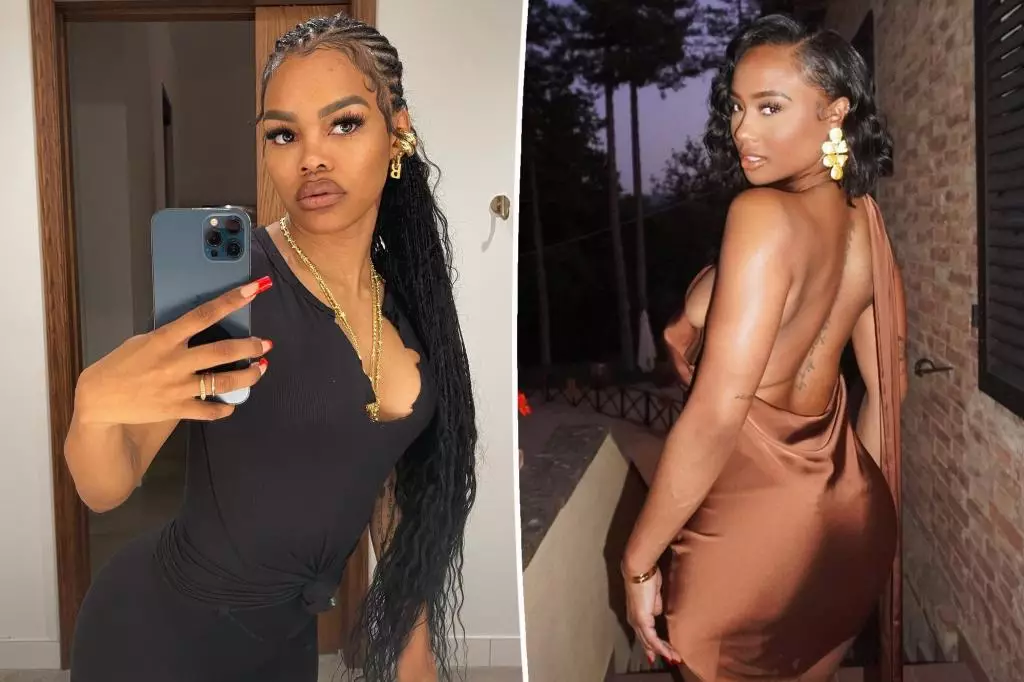In the world of celebrity culture, public relationships and breakups often fuel drama that captivates audiences. The recent clash between singer Teyana Taylor and sports analyst Kayla Nicole provides a quintessential example of how quickly a seemingly innocuous comment can ignite a heated feud. The backdrop of their exchange revolves around a Halloween costume, each filled with layers of personal history, public perception, and social media dynamics.
The tension emerged when Nicole, a former girlfriend of NFL star Travis Kelce, made a rather provocative remark during a podcast appearance, where she mentioned dressing up as Taylor, seemingly unassuming. However, the implications of her comment—“famous at the time”—struck a nerve with Taylor, who quickly voiced her displeasure. The moment encapsulated the impact of social media remarks, where the most trivial statements can provoke deep feelings and the promptness of public responses can escalate tensions to a boiling point.
Teyana Taylor, known for her powerful music and performances, used the opportunity to draw on cultural narratives by referencing Taylor Swift’s hit song “Shake It Off” in her social media response. This choice was not merely an artistic expression; it was a commentary on the nature of fame and respect within the music industry. Adding Swift’s anthem to her post not only highlighted Nicole’s perceived disrespect but also offered Taylor a chance to align herself with another celebrated artist, thereby reinforcing her own credibility and standing in the entertainment world.
In her pointed Instagram caption, Taylor analyzed the situation deftly, hinting that the public should be aware of the underlying motives behind Nicole’s choice of words. By saying, “I know 2025 gon’ hate to see a Taylor coming!!,” she was likely suggesting that the future ramifications of such comments could lead to a lack of respect within the community of Black women. This highlights the intersectionality of race, gender, and artistry in today’s media landscape and how these facets intertwine to fuel public perceptions and rivalries.
Taylor didn’t stop at a cheeky comment; she further elaborated on her feelings during a podcast, articulating her disappointment with Nicole’s remarks. The discussion turned from a playful jab to a serious critique of societal expectations on women, especially Black women, who navigate public personas in a male-dominated industry. Taylor highlighted that Nicole’s comments were not only distasteful but presumptive of their shared history and experiences, sparking a discourse regarding respect among women in the industry.
Nicole attempted to defend herself, stating that her comments stemmed from personal experiences and lessons learned over the years. Her insistence on not condoning her past decisions positions her as someone looking to find empowerment amidst adversity. Yet, the internet has taken note, analyzing the intricate dance of their rivalry, suggesting that Nicole’s actions may have come across as intentionally calculated.
This social media spat reveals a crucial aspect of contemporary discourse surrounding women in the public eye. Their few words often become national conversations, creating a culture where women are judged not only for their actions but also for how they address each other. The friction between Taylor and Nicole emphasizes a broader societal commentary on how women must carry the weight of their history while navigating their narratives in public life.
The Emotional Landscape of Celebrity Feuds
What makes this exchange particularly noteworthy is the emotional undercurrents that define it. Taylor expressed feeling blindsided and manipulated by Nicole’s comment about dressing up as her, which ultimately reflects deeper insecurities many people, particularly women, grapple with. The reality is that public relationships can often reshape individuals’ identities—one in which admiration can mingle distressingly with envy and rivalry.
On the flip side, Nicole used the situation to reflect on her past, providing insight into her emotional state at the time she dressed up as Taylor. It was a revelation cloaked in vulnerability, indicating a desire for growth. Her post, set against Beyoncé’s empowering lyrics, suggests that amidst the turmoil, both women are sharing a common struggle in their careers and decisions.
Ultimately, this clash transcends the superficial accumulation of likes and comments; it showcases the complex dynamics between identity, artistry, and public perception. As such, the rivalry between Teyana Taylor and Kayla Nicole offers an engaging snapshot into the lives of two prominent figures, illuminating not just a public feud, but also the trials and tribulations that shape their artistic expressions and emotional resolutions. This saga reminds us that even behind the glamour of celebrity life, the quest for respect and validation remains palpable, grounded in the very real emotions that often drive public narratives.

